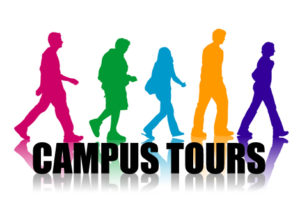 The campus visit is the golden opportunity to cement the emotional commitments of prospective students and their parents. Visits offer your greatest opportunity to capture the magic that is unique to your college. College and universities know this. They recognize the importance of creating and implementing a successful campus visit program. They know that visits that excite the students they are recruiting are very likely to lead to enrollment. And, they are well aware that a single bad experience during a campus tour or visit can completely derail a student’s plan to enroll.
The campus visit is the golden opportunity to cement the emotional commitments of prospective students and their parents. Visits offer your greatest opportunity to capture the magic that is unique to your college. College and universities know this. They recognize the importance of creating and implementing a successful campus visit program. They know that visits that excite the students they are recruiting are very likely to lead to enrollment. And, they are well aware that a single bad experience during a campus tour or visit can completely derail a student’s plan to enroll.
These are well-known facts in our industry, yet college-bound students say that colleges do not differentiate themselves through their tour and visit programs. In our national co-sponsored studies, and through focus group research we conduct, 60% of students say that campus tours are “all the same,” and they don’t consider that a good thing. Students tell us that most don’t generate any more or less excitement than all of the others they experienced.
Over 65% of college-bound students participating in our most recent national co-sponsored study, “Emotional Motivators,” visited four or more colleges during their college search. You might call them “experts” in the college visit experience. And they have very strong opinions about what colleges are getting right, and wrong, with their college visits programs.
What do students say makes for a winning campus visit?
Customization and personalization
Prospective students tell us that tours that focus primarily on the attributes of the college without consideration of their specific interests are “boring” and “redundant.” The best tours, they say, are those that feel customized. Students who receive one-on-one tours where the focus is completely on them and what they want, tend to see the campus visit experience as a demonstration of the college’s personal interest in them
However, some colleges are finding ways to personalize group tours. “The college I chose gave this great tour. Everyone in the group had a lot in common and we saw places we all cared about. I even made friends with some of the other students on the tour,” said one recently enrolled student.
Grouping like-minded students on tours is an effective strategy and can be implemented in a number of ways. Simply asking prospective students a few questions prior to their scheduled visit can determine which group would be most effective.
Interaction with current and other prospective students
Who is the most important member of your team when it comes to having a winning campus visit program? Your current students! Tour guides, student ambassadors, student employees, and, yes, the students hanging out on the quad (or wherever your students tend to congregate) are your greatest assets.
College-bound students tell us that interaction with current students on a campus plays a critical role in their college selection decision. It gives them a feel for what their life will be like if they enroll. Prospective students respond very favorably to current students who are friendly, enthusiastic, happy and welcoming. Some of our clients have found creative ways to encourage such interactions. One college hosts extracurricular fairs on the same days tours are held. The college walkways are lined with student-manned tables and booths representing the various organizations and opportunities for new students to get involved in campus life. “All these students were talking to me and encouraging me to join their club. I felt like they really wanted to get to know me. That’s when I knew this was the place for me,” described one student.
Another college uses social media and on-campus marketing efforts to encourage student interaction with visiting newcomers. According the Director of Admission the strategy has been very effective. “We remind the students of how they felt when they first visited our campus and ask them to go out of their way to be friendly. It is great to see so many of our students proudly talking about our college to our visitors. The unexpected bonus is that it has served as a subtle reminder to the staff and faculty that their interactions are important, too,” she said.
The #1 MUST DO on your list!
During a campus visit about one-half of prospective students see and experience things about the college that they find unappealing. This finding may be expected since all students are not going to like everything they see at all of the campuses they visit. What is more concerning is that only 13% of students say that an admission counselor ever inquired if they had seen or experienced anything the student found unappealing or concerning about their campus.
You are missing a key opportunity to address misconceptions and overcome objections if you, like many colleges, aren’t asking what students liked and didn’t like, about what they experienced during their visit. Simply asking, “How was your tour?” isn’t enough. Probe for the specifics of what they did and did not like. If you don’t ask, they won’t tell and you will never know the real reason they didn’t enroll.
Taking a turn and shifting gears now …
We have kicked off our series of one-day intensive Yield Season Counselor Training Workshops on host college campuses across the country.
We just completed a workshop at Drew University in New Jersey (thanks Bob, Kay and Heather for being the gracious hosts to the counselors from surrounding colleges who attended). And we have workshops scheduled in Kansas City (at Rockhurst University on January 16th), Atlanta (at Oglethorpe University on January 18th), Greeneville, TN (Tusculum College on January 23rd).
There will be more. We are talking to colleges around the country about being a host site (there are incentives that make being a host site very attractive so contact us if you have an interest hosting a workshop).
College admission directors and enrollment managers often tell us that they wish they had the budget to hire professionals to train their admission teams. They tell us they know they need training; that their counselors would greatly benefit from learning new skills; and the right program would energize the entire staff. “But,” they say regretfully, “we just don’t have the budget to support the expenditure this kind of professional development often costs.”
Whether you are a host college or not this is a very affordable workshop designed to benefit seasoned counselors just as much as counselors who are going through their first full recruiting cycle. Counselors you send will return home with skills and techniques that can be shared with the whole admission team.
Your admission counselors will learn new methods to:
- Adopt a student-centric approach to recruiting.
- Reveal the needs, preferences, motivations, and perceptions of prospective students.
- More effectively present the value of their college based on what the student (and parent) perceives as being most valuable.
- Manage the perceptions and opinions that prospective students form about their college.
- Uncover hidden influences that will impact a student’s enrollment decision.
- Learn how to differentiate your college.
- Create and foster relationships with students that will lead to enrollment.
- Discover the true influence of cost and isolate factors that will outweigh cost.
- Enlist the support and influence of parents.
- Share their new skills and techniques with the entire admission team.
The Bottom Line: You can up your game this yield season for a minimal investment in time and money and a maximum return in your enrollment. If you are interested in attending a workshop, suggesting a location, or even hosting a workshop, ask for details here.
If I can help you with your recruiting efforts in any way, please feel free to call or email me. I would love to talk to you about our powerful and effective Yield Enhancement System (YES). Admission offices use this system to improve their mass communications efforts, have more effective one-on-one interactions, and ultimately, boost their yield. My contact information is at the bottom of this post.
Continue the conversation on Twitter @LongmireCo. For more information about Longmire and Company’s Interactive Counselor Training Program, click here. Subscribe to Versions of Conversion today so you don’t miss any of this highly-valuable information.
 Rick Montgomery is as an Enrollment Strategist at Longmire and Company. With over 20 years in higher education marketing, he brings an innovative approach to helping colleges and universities meet their enrollment goals. Rick can be reached at 913/492.1265 x.708 or via email at rmontgomery@longmire-co.com.
Rick Montgomery is as an Enrollment Strategist at Longmire and Company. With over 20 years in higher education marketing, he brings an innovative approach to helping colleges and universities meet their enrollment goals. Rick can be reached at 913/492.1265 x.708 or via email at rmontgomery@longmire-co.com.
 Successful admission professionals understand that developing a connection with a student can greatly increase his or her commitment to the college and improve the likelihood of enrollment. In fact, our studies have demonstrated that 8 in 10 students say the relationship they formed with their chosen college was influential in their decision to enroll.
Successful admission professionals understand that developing a connection with a student can greatly increase his or her commitment to the college and improve the likelihood of enrollment. In fact, our studies have demonstrated that 8 in 10 students say the relationship they formed with their chosen college was influential in their decision to enroll.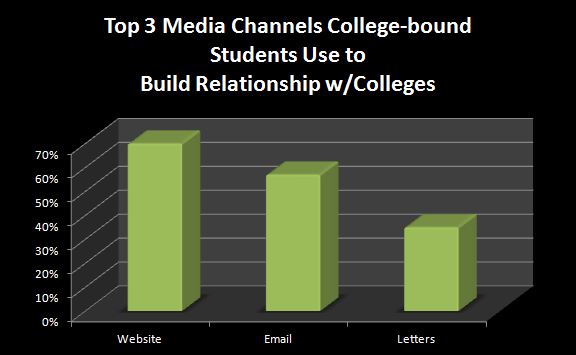

 We are talking to colleges around the country about being a host site (there are incentives that make being a host site very attractive so contact us if you have an interest hosting a workshop).
We are talking to colleges around the country about being a host site (there are incentives that make being a host site very attractive so contact us if you have an interest hosting a workshop).
 Bob Longmire is President of Longmire and Company, Inc. He is a recognized expert on the topic of how prospective students and parents form their college selection decisions – and how colleges can use that knowledge to grow and control their enrollment. He can be reached at (913) 492-1265, ext 709 or at
Bob Longmire is President of Longmire and Company, Inc. He is a recognized expert on the topic of how prospective students and parents form their college selection decisions – and how colleges can use that knowledge to grow and control their enrollment. He can be reached at (913) 492-1265, ext 709 or at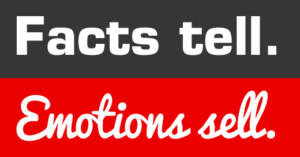 Preliminary findings from our latest national co-sponsored higher education study are definitive on this subject: Your prospective students want/need you to understand the feelings and emotions they are experiencing as they navigate the college selection process.
Preliminary findings from our latest national co-sponsored higher education study are definitive on this subject: Your prospective students want/need you to understand the feelings and emotions they are experiencing as they navigate the college selection process.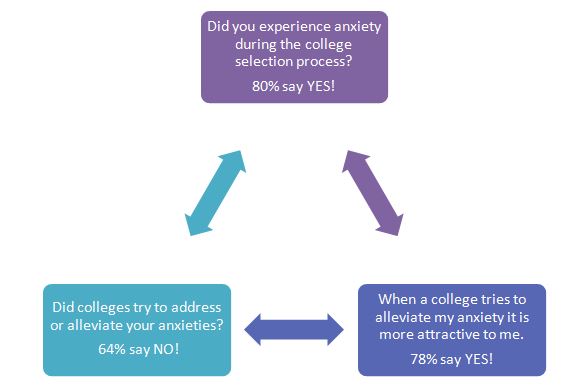
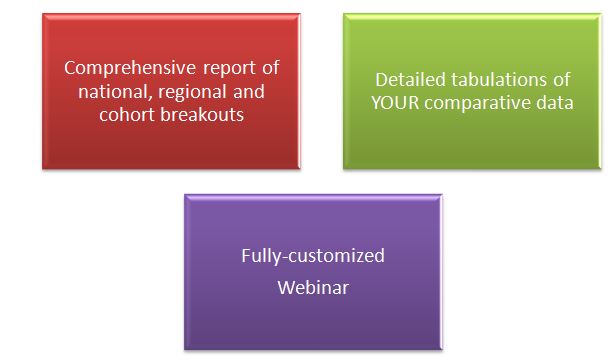 As a co-sponsor you receive a comprehensive set of tabulations relating to your pool of students, as well comparative data of others in your cohort and other market segments. You’ll also receive the national summary report before its widespread release.
As a co-sponsor you receive a comprehensive set of tabulations relating to your pool of students, as well comparative data of others in your cohort and other market segments. You’ll also receive the national summary report before its widespread release.
